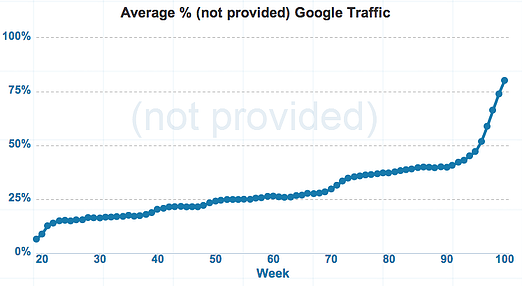What Is Not Provided?
The Keyword Report in your web analytics program (e.g. Google Analytics) shows the keywords (search phrases) people used to find your website in a search engine. For years, this report has provided valuable insight about how people find your website.
Over the last two years, Google has begun limiting the amount of keyword data provided in this report. Simply put, if a visitor performed a Google search, Google would not share that visitor's keyword information with your website's analytics tool. Instead, the keyword data would show as "(not provided)" in your analytics tool keyword report.
In the beginning, this affected less than 5% of keyword data. Over time, the percent of traffic affected has steadily grown, and due to some recent changes by Google, we now expect 100% of Google traffic will lack keyword data by the end of 2013. This means we will no longer be able to see the exact keywords that drove traffic to your site in Google Analytics (or any analytics tool for that matter).
(via notprovidedcount.com)
Why Is Google Restricting Keyword Information?
In a word, "privacy." Google claims that blocking this kind of data from web analytics reports is a more secure experience for the site visitor.
Does This Apply To Bing and Yahoo Searches?
At the moment, no. Bing and Yahoo keyword data is still captured in your analytics tool. However due to Bing and Yahoo's market share and different ranking factors, this is not a valid substitute for evaluating Google performance.
Does "(not provided)" Apply To Google Adwords?
Google is not restricting keyword information when someone clicks on a Google search advertisement (i.e. PPC). So if you run Google ads, you have 100% visibility to the keywords people used to find and click your ads.
Measuring Success Going Forward
As you can imagine, this makes our jobs as search marketers and web analysts a bit more challenging.
Fortunately, we're always up for a good challenge.
Using a combination of different reports and tools, we can still gain valuable insight about how people find a website and what they do once they arrive. Further, we can use this information to improve the performance of your website.
Do we miss keyword data? Yes.
Do we wish we could have it back? Absolutely.
Is this the end of SEO? Heck no. As the internet continues to be the fastest growing marketing medium out there, SEO will continue to play a critical role in successful internet marketing.
Our objective with every undertaking is to have a meaningful, positive impact on our client's business. We're also committed to showing and measuring that success as best we can. While this change makes certain analysis a bit more challenging, we are always innovating and finding new, creative ways to optimize marketing investments.
If you have any questions about how this impacts your data going forward, please do not hesitate to reach out. We'll be happy to walk you through your reports, show you specifically how your data is impacted, and show you how to measure success going forward for your SEO campaign.






Agree, disagree, or just have something to add?
Leave a comment below.